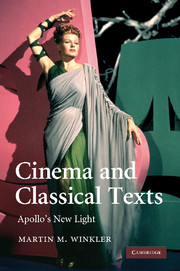Book contents
- Frontmatter
- Contents
- List of illustrations
- Acknowledgments
- ΦΟΙΒΩΙ ΑΠΟΛΛΩΝΙ ΦΩΤΟΚΙΝΗΤΗΙ
- Introduction: The god of light and the cinema eye
- 1 A certain tendency in classical philology
- 2 Divine epiphanies: Apollo and the Muses
- 3 The complexities of Oedipus
- 4 Patriotism and war: “Sweet and fitting it is to die for one's country”
- 5 Helen of Troy: Marriage and adultery according to Hollywood
- 6 Women in love
- Epilogue: “Bright shines the light”
- Bibliography
- Index
Epilogue: “Bright shines the light”
Published online by Cambridge University Press: 18 August 2009
- Frontmatter
- Contents
- List of illustrations
- Acknowledgments
- ΦΟΙΒΩΙ ΑΠΟΛΛΩΝΙ ΦΩΤΟΚΙΝΗΤΗΙ
- Introduction: The god of light and the cinema eye
- 1 A certain tendency in classical philology
- 2 Divine epiphanies: Apollo and the Muses
- 3 The complexities of Oedipus
- 4 Patriotism and war: “Sweet and fitting it is to die for one's country”
- 5 Helen of Troy: Marriage and adultery according to Hollywood
- 6 Women in love
- Epilogue: “Bright shines the light”
- Bibliography
- Index
Summary
Apollo was present at the birth of Western literature, for he set in motion the plot of Homer's Iliad. His sister Athena fulfills a comparable function in the Odyssey. In the Iliad she had aided and protected several of the Greek heroes, for instance advising Achilles to restrain his anger against Agamemnon. Throughout the Odyssey she is Odysseus' faithful guardian and engineers his return to Ithaca. As goddess of wisdom Athena is frequently associated with culture and civilization. The library at Pergamon, mentioned in Chapter 1, had a larger-than-life statue of her. Athena's closeness to Apollo is most evident in The Eumenides, the concluding play of Aeschylus' Oresteia. The two gods work together toward Orestes' absolution from blood guilt for the murder of his mother.
The ending of Franco Rossi's Odissea (“The Odyssey,” 1968) shows that in the cinema Athena can represent the ideal of culture and civilization just as much as Phoebus Apollo, the shining god of light. This six-hour production is among the greatest films ever made of a work of classical literature, and Rossi incorporates and presents Athena in unusually inspired ways. Whenever she disguises herself as a mortal to remain unrecognized by the humans among whom she appears, actors play the people she impersonates. But when she and Zeus deliberate about the fate of Odysseus on Olympus, Rossi films ancient marble statuettes of these gods and adds their dialogue in voice-over.
- Type
- Chapter
- Information
- Cinema and Classical TextsApollo's New Light, pp. 295 - 303Publisher: Cambridge University PressPrint publication year: 2009



